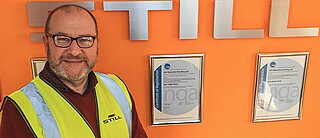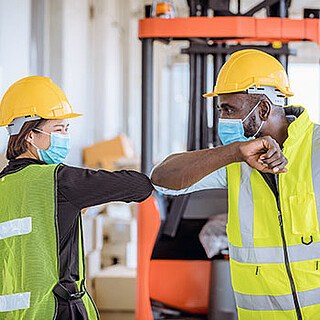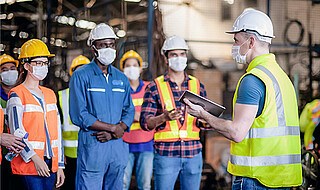How Covid-19 has changed 'safety' in the materials handling industry

Throughout the Coronavirus pandemic every business has had to make changes to keep their operations moving. With an industry that relies on the handling of goods, now has never been a more important time for health and safety in materials handling. In this interview, we ask Andrew Pye, HSEQ Manager at STILL how Coronavirus has changed safety within the industry.
What impact has Coronavirus had on Health and Safety in the materials handling industry?
I think we can all agree that 2020 is a year we’ll never forget. For the role of Health and Safety we were faced with an enormous challenge. As an industry, materials handling is quite high risk; the workforce carries out physical operations every day involving handling, lifting and working on shared equipment.
For my role in Health and Safety at STILL, I always start off the year looking at our previous year’s performance, assessing what has worked, and what hasn’t. We then formulate a plan for the year to work on the areas that need improvement. I remember quite suddenly in February last year, we all started talking about the word “COVID” and how it was creeping into the UK. At first, I doubted it, saying to the team “it won’t be as bad as flu, try not to worry too much”. By March however, we were suddenly faced with a Global pandemic, and that’s when we parked our other projects and focused fully on ensuring that the pandemic caused as little disruption as possible to our operations. Stopping our operations and service engineers from visiting and maintaining our customer fleets was not an option and would have had disastrous consequences to supply chains across the UK.
How has STILL worked safely during the Coronavirus pandemic?
We have managed to work safely throughout the pandemic thanks to our strong team. We have a culture of Health and Safety here that every member of the team follows and when the pandemic hit every single individual was happy to rise to the challenge. This positive culture doesn’t happen overnight, in fact it was one of my first projects when I joined STILL back in 2015. I began by travelling the country and meeting staff to understand how H&S was considered across the business. I felt despite the compliance being met, there was a real opportunity to improve the Health and Safety culture within STILL UK. I'm a real believer if you can create a solid culture, that the Health and Safety performance and the way that people act, will follow naturally.

Fast forward to 2020 and we followed much of the same approach that we had followed for the past few years, we kept our team up to date with the ever-changing pandemic situation with regular information that was coming out from the UK Government, making sure we selected the most relevant pieces of media and translated the information into safety alerts and bulletins for everyone to easily digest. Thanks to that positive culture of H&S embedded within STILL, I’m extremely proud to say that we have not recorded a single Covid-19 infection linked to the business or within our activities. That’s quite amazing when you consider our service engineers, who throughout the pandemic have risked their health and wellbeing by going out to visit our customers up and down the country during what was quite a scary time.
How can the materials handling industry stay ‘Covid compliant’ and remain operational?
It has been challenging for the whole materials handling industry - fundamentally the sector relies on goods and equipment being handled by people. Our customers who operate in logistics and warehousing have a workforce that will work closely together and share equipment on a daily basis, e.g. many operators will use the same truck. Fortunately for us, a large amount of information has been shared by the UK Government and the HSE regarding workplace compliance surrounding Covid-19.
We’ve been able to apply the guidance and place this into our risk assessments. The British Industrial Truck Association (BITA) and the Forklift Truck Association (FLTA) were also great in providing reliable information to our customers regarding Covid-19. Customers in the food supply chain industry (that have seen an increase in business) have encountered challenges around shared equipment and a risk of cross-contamination. With this in mind, we’ve offered support and advice on the cleaning of equipment between shift patterns and offering Short Term Rental equipment so they can facilitate demand without risking the safety of their staff.

Has STILL helped its customers with Covid-19 Workplace Recovery plans?
As I mentioned before, the UK Government has provided a great deal of guidance to businesses to help them reopen and stimulate the economy, a key component of that guidance has been ensuring everyone is staying safe. For us that’s not just our employees, it’s our customers and contractors too. When we saw businesses reopening, our customers wanted to know what we were doing (as contractors repairing their equipment) to meet the latest guidelines. We would ask the same questions in return to ensure our engineers were visiting safe environments. What emerged was a dialogue between STILL and our customers on Health and Safety, we’d assist and share guidance and risk assessments and this has helped them go on to advise their own workforce on H&S, plus ensure that future visits by our service engineers or other contractors are safe and contact-free.
During the first lockdown, some of our customers needed to close or reduce the use of their materials handling equipment, at this point we offered a service to check their equipment over before ‘parking up.’ We have also assisted customers in their recovery plans by ensuring equipment is ready to go back into use. Servicing, inspections and a thorough pre-use inspection is undertaken if equipment has been out of use for a period of time to ensure the safety of that equipment.
What recommendations would you make to keep warehouses clean and safe?
A key element of safety throughout the pandemic has been establishing a thorough cleaning regime. Our risk assessments identified that to prevent the air born or surface contact infections that spread Coronavirus, our cleaning activities had to be increased and improved. This starts with visiting locations and identifying what are the common touch points, such as kitchens and toilets for example, and then increasing how regularly they’re cleaned. Next, it’s a case of educating employees on cleaning surfaces before the next person comes into contact with it. For the materials handling sector, that means equipment; factoring a clean-down process by the employee at the end of the shift can make the difference between keeping the operation running smoothly or potentially a member of the team being signed off sick with Covid-19.
Has staff wellbeing become a priority since Coronavirus?
Employee wellbeing has always been an integral part of our business, it’s not just about the formalities but ensuring our employees feel valued and part of the STILL family, that said, we are of course always looking to improve. Interestingly before the pandemic hit in 2020, employee wellbeing was one of my team’s activities to work on for the year. Since joining STILL, myself and my colleagues have improved the H&S culture, and this is reflected in our performance figures across the UK.
The next project goal was mental health and wellbeing. Whilst we started the year with this plan, the pandemic forced our hand slightly, particularly when people started to work from home and began to feel isolated. The issues of isolation surrounding remote working became an unexpected priority, but thankfully software like Microsoft Teams arrived at just the right time. Throughout the past year we have increased the volume of regular meetings with managers and their teams to discuss work-related topics. But we have also established Virtual Coffee Mornings every Thursday where we gather together for a natter and proactively keep the conversations away from work. For those people that are working completely remotely on their own, it's a great opportunity to join in a conversation and engage with different members of the team.
In addition to this and as a small token of our appreciation, our Service and Operations Director, Gillian Reed has personally been involved in obtaining, assembling and distributing care packages to our field-based engineers as a token and gesture to acknowledge their hard work and commitment during this extraordinarily challenging time.
We have also a dedicated Employee Assistance Program which is available for all employees and their family members free of charge should they need further support.
Find out how our professional team can help
With our solid Health & Safety culture at STILL, we can help your business navigate through challenging times, if you need advice on any of the topics mentioned above, please reach out and Contact us today!
Comments
No comments
Subscribe to the blog !
Be informed as soon as an article is published. You can unsubscribe anytime.

Leave a comment